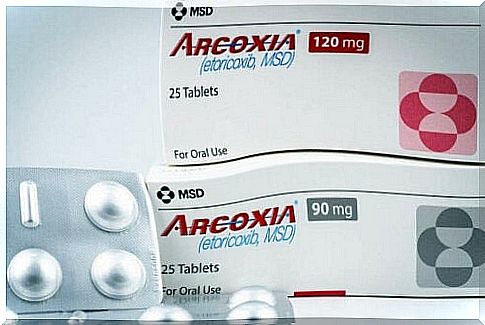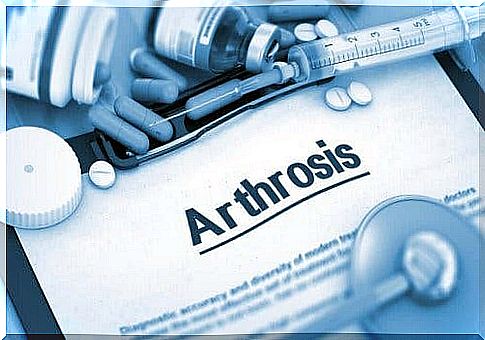Etoricoxib: An Anti-inflammatory Drug

Etoricoxib is an anti-inflammatory drug that belongs to a group of medicines called selective COX-2 enzyme inhibitors. It belongs to the group of NSAIDs that inhibit the induced synthesis of prostaglandins. If you want to learn more about etoricoxib and the treatments, keep reading!
Synthesis of prostaglandins occurs via selective inhibition of COX-2, which is responsible for the analgesic and anti-inflammatory effect. Etoricoxib comes in the form of tablets for oral administration.
Etoricoxib: Treatments with anti-inflammatory drugs

Etoricoxib helps reduce joint pain and inflammation. It is effective in treating osteoarthritis, rheumatoid arthritis, ankylosing spondylitis and gout. However, etoricoxib is also used for the short-term treatment of moderate pain after dental surgery.
Below you can see the different diseases that etoricoxib can treat:
- Osteoarthritis, a condition of the joints. This leads to a gradual breakdown of the cartilage that dampens the ends of the bones. This results in inflammation, pain, tenderness, stiffness and disability.
- Rheumatoid arthritis causes pain, stiffness, swelling and progressive loss of mobility in the affected joints. It also causes inflammation in other areas of the body.
- Ankylosing spondylitis is an inflammatory disease of the spine and joints.
- Gout is a condition with sudden and recurrent flares. It manifests itself with very painful inflammation and redness in the joints. Deposition of mineral crystals in the joints causes gout.
Administration of Etoricoxib
You must follow your doctor’s instructions, and it is very important to use the lowest dose that achieves pain relief. Etoricoxib can be taken with or without food, although the effect is faster if taken without food.
You should not take Etoricoxib for longer than necessary, as it may increase the risk of heart attack and stroke, especially after long-term treatment and high doses.
There are different doses for this medicine, and depending on the disease, the actual dose will vary. Follow these guidelines carefully:
- Osteoarthritis: The recommended dose is 30 mg once a day, with a maximum of 60 mg once a day if necessary.
- Rheumatoid arthritis : 60 mg once a day is recommended, it can be increased to a maximum of 90 mg if necessary.
- Ankylosing spondylitis : The dose is 60 mg once a day, increased to a maximum of 90 mg.
- Drop : The recommended dose is 120 mg once a day. It should only be used during periods of acute pain, and a maximum of 8 days.
- Postoperative pain after dental surgery: The recommended dose is 90 mg once a day for a maximum of 3 days.
Note: If you forget to take a dose, take the corresponding dose the next day at the usual time.

What precautions do you need to take?
In people over 65 years of age, it is not necessary to change the recommended doses. On the other hand, in people with liver problems, it is important to take into account the severity of the disease.
If you have mild liver disease, you should not take more than 60 mg a day. However, if you have moderate liver disease, you should not take more than 30 mg a day.
Etoricoxib: Possible side effects of anti-inflammatory drugs
Like all medicines, this medicine can cause side effects, although not everybody gets them. The frequency of possible side effects is as follows:
- Very common : Abdominal pain.
- Common: Fluid retention, dizziness, headache, palpitations, arrhythmias, increase in blood pressure and intestinal and stomach diseases. Changes may also appear in blood tests related to the liver, bruising, weakness and stomach ulcers.
- Uncommon: Includes, but is not limited to, urinary tract infection, kidney problems, gastroenteritis, increased or decreased appetite, anxiety, depression, drowsiness and heart problems.
- Rare : Angioedema and anaphylactic reactions including shock. Hepatitis, yellow skin and eyes (jaundice), confusion and severe skin reactions may also occur.
However, you must stop taking this medicine and see a doctor immediately if you see signs of an allergic reaction or experience symptoms such as shortness of breath, ankle edema, jaundice or severe abdominal pain.
Conclusion
Experts have concluded that Etoricoxib is not more effective than the rest of the NSAIDs in relieving symptoms of diseases such as osteoarthritis, rheumatoid arthritis and acute gout. Furthermore, it has been associated with an increased risk of hypertension. Therefore, be sure to consult your doctor or pharmacist about any questions you may have.









